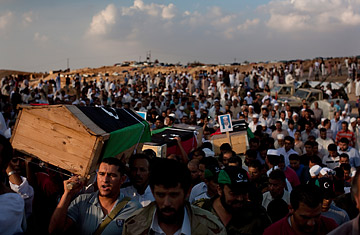
Men carry bodies found in a mass grave to a cemetery overlooking the Libyan town of al-Qala on Sept. 30, 2011
(2 of 2)
The New York City–based monitoring group Human Rights Watch released a report this week alleging an increasingly systematic pattern of abuse by the former rebels against Gaddafi-loyalist captives. Anti-Gaddafi militias, often operating independently of the governing National Transitional Council (NTC), carry out their own versions of justice, often placing suspected loyalists in prisons and secret detention centers without trial, and even torturing some of them.
The behavior raises serious concerns, observers say, as the NTC's battle for control over larger Gaddafi strongholds like Sirt and Bani Walid continues. But even if the NTC gets a grip on its roving militias, the loyalist towns pose a conundrum for the new authorities. Most of the towns were undoubtedly inhabited not just by Gaddafi supporters but by his forces too, the rebels say. They also say that the residents of the Nafusa Mountains village of Gawaleesh — now a ghost town — were the ones who staffed Gaddafi's nearby military base and carried out abuses against the neighboring town of al-Qala.
In a clear reversal of fortunes, the writing on Gawaleesh's abandoned walls now spells out who's in charge. "Al-Qala is your master," reads graffiti painted on the facade of a looted convenience store. "This is what happens to anyone who sells his country," another wall warns. For Gawaleesh, the price for supporting Gaddafi — on whatever level that amounted to — has been paid. The town is ghostlike and silent; the doors of homes and shops have been busted open by bullets, their interiors ransacked and looted. The only sound is that created by the metal doors creaking on their hinges in the wind. "They were from a Gaddafi brigade," laughs a fighter from Zintan who pulls up in his pickup truck. Where did they go? "Where is Gaddafi?" he shrugs and drives on.
Al-Qala, meanwhile, has been dealing with retribution. On Friday, hundreds of townspeople from al-Qala and the neighboring village of Om al-Jersah gathered on a hilltop above al-Qala to bury the latest 10 bodies discovered in a mass grave. Fathi Mohamed Ajad's brother Youssef was one of them. Gaddafi's forces — many of them, residents say, operating out of Gawaleesh and al-Asaaba — had tortured him to death in June. The others had been shot, and the collection of bodies had been dumped in an irrigation reservoir at the edge of an olive grove in Om al-Jersah. Youssef's body was the only one to have been buried, only shallowly in the outer furrows of the field nearby, and dogs had begun to eat it. "I knew him from his teeth and his trousers," Ajad says of the otherwise unrecognizable form.
A month before, residents had discovered a mass grave there containing 35 bodies — also civilian residents of the town, including Ajad's father, uncle and nephew. In early summer, Gaddafi's forces had moved into the town, rounding up any man they found, residents say. The oldest discovered in the mass grave was 89-year-old Salem Younes Krer; the youngest was 17-year-old Amhamed Mohamed. And many there now feel the pull of vigilante justice. "We have caught almost all of them," says Talal al-Hadi, the father of another victim, resolutely, referring to the alleged killers. "They were all Libyans," he adds. Al-Hadi means the perpetrators weren't the foreign mercenaries often alleged to be behind Gaddafi's worst wartime abuses. But there in the Nafusa Mountains, where "everyone is family," his words carry a bitter and more chilling message: the perpetrators were neighbors, and this fight is personal.
In al-Qala, like most of the other mountain towns, the former rebels have been quick to embrace their long-repressed Amazigh culture, raising the symbolic flag of the Amazigh alongside that of the NTC. The local school is back in session. And even as bodies are laid to rest, most say they're optimistic for a better future.
In al-Asaaba, the schools and banks remain closed, and many of the residents remain bitter and fearful. "We don't have money. Our kids can't go to school. And we can't go through the checkpoints because we're from al-Asaaba," says Masbah. Still, the residents of al-Asaaba say they have accepted the inevitable. "We're all revolutionaries now," Masbah says with an ironic laugh.
